人教版新目标八年级上册 英语语法知识点
新版新目标英语八年级上册unit7语法总结
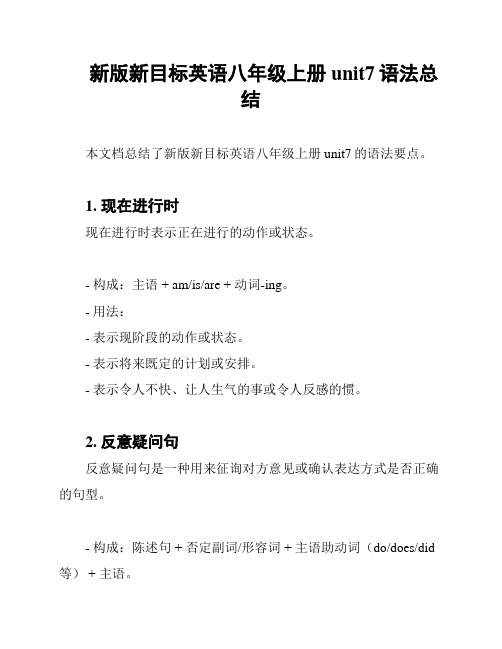
新版新目标英语八年级上册unit7语法总
结
本文档总结了新版新目标英语八年级上册unit7的语法要点。
1. 现在进行时
现在进行时表示正在进行的动作或状态。
- 构成:主语 + am/is/are + 动词-ing。
- 用法:
- 表示现阶段的动作或状态。
- 表示将来既定的计划或安排。
- 表示令人不快、让人生气的事或令人反感的惯。
2. 反意疑问句
反意疑问句是一种用来征询对方意见或确认表达方式是否正确的句型。
- 构成:陈述句 + 否定副词/形容词 + 主语助动词(do/does/did 等) + 主语。
- 用法:用于征询对方意见或确认句子的真实性。
3. with引导短语
with引导的短语可以修饰名词或句子。
- 修饰名词:
- 表示状态或特征。
- 表示方式、工具或手段。
- 修饰句子:
- 表示伴随或条件。
4. 省略to的不定式
在某些情况下,可以省略to的不定式前的to。
- 具体情况:
- 动词make、let、help、have。
- 表示让步的as if、as though、if only。
- 作宾语的动词感官动词如see、hear、feel。
以上是新版新目标英语八年级上册unit7的语法总结。
人教新目标八年级英语上册重难点知识点归纳

PEP八年级英语上册Unit 1 Where did you go on vacation?难点:不定代词anyone, something, anything, everything, nothing 等的用法;反身代词的用法知识点&考点:go on vacation/be on vacation 去度假stay at home 待在家里go out 出去go with 和……一起去……Long time no see. 好久不见。
take photos 照相quite a few 相当多most of time 大部分时间介词to表目的的用法buy sth. for sb. = buy sb. sth. 买……给……taste good 尝起来不错(感官动词+adjective)How do you like it = What do you think of it 你觉得……怎么样?have a good time = have fun = enjoy oneself玩得开心of course 当然nothing … but …除了……之外没有什么(not … but …)The only problem was that …(同位语从句)seem to be/seem + adj. 看起来……keep a diary 记日记+ at + 小地点arrive+ in + 大地点decide to do 决定做某事try doing sth. 尝试做某事 try to do sth. 尽力做某事feel like 感觉到 feel like + n./ v-ing想要……ride … to …骑……到……许多的:a lot of + 可数名词 lots of + 可数or不可数名词I wonder that …我想知道……in the past 在过去enjoy doing sth. 享受做某事walk around 到处逛逛感叹句:What + 冠词 + adj. + n. + (it is) = How + adj. + 冠词 + n. + (it is)start doing sth. 开始做某事 stop doing sth. 停止做某事 finish doing sth. 结束做某事because & so(不可同用)wait for …等待……because of + n.a little/ a few 一些(两者的区别,以及与little/few 的区别)enough + n. / adj. + enoughas + adj./adv. + as 和……一样……one bowl of …一碗……along the way 沿着这条路时间段+ later = after + 时间段……之后other, others, the other, the others, anotheron trip 在旅途中find out 找到,找出 / find 寻找 / look for 寻找so + adj. + that + 从句如此……以致……tell sb. (not) to do sth. 告诉某人(不要)做某事keep doing sth. / go on doing sth. 继续做某事keep sth. + adj. 使……保持……状态up and down (人)来来往往;(物)上上下下in excitement = excitedly 兴奋地come up / come out / come on / come inforget to do sth. 忘记做某事 forget doing sth. 忘记做过某事like / dislike + n. / v-ing喜欢/不喜欢某物/做某事something + adj. ……的事情Why not + v. = Why don’t you + v. 为什么不……呢?Unit 2 How often do you exercise?重点:1. How often 句型的运用;2. 六个频度副词never, hardly ever, sometimes, often, usually, always的差异、理解及使用;3. 频率数词once, twice等的认识和运用;4. 一般现在时不同人称谓语形式的变化及一般疑问句的问答。
新人教新目标版八年级英语上册短语语法知识点汇总

人教版八年级英语上册短语语法知识点总结初二英语课组2019年[由我校初二英语科组根据最新考纲和近几年中考的趋势加上我校学生的实际情况,结合初二全体英语科组的力量,汇编了这一份重点总结,编好一份学案不易,望同学们能好好利用。
]Unit 1 Where did you go on vacation一、必背单词短语。
Section A1.Where did you go on vacation? (P. 1)on vacation意为“在度假”,结构“on+名词”表示“在某种状态中”。
例句:My family went to Hainan on vacation last year.2....visited my uncle (P. 1)visit此处用作及物动词,后接人或物做宾语,意为“拜访、看望”,后接表示地点的名词,意为“参观、游览”。
例句:I visited my grandmother last week.例句:Do you want to visit Shanghai?3....go with anyone? (P. 2)(1)anyone用作不定代词,意为“有人、任何人”,相当于anybody,用于疑问句和否定句中,在肯定句中用someone或者somebody。
但是anyone也可以用在肯定句中,表示“任何一个人”。
例句:Did you meet anyone friendly in that city?例句:Anyone can be helpful in some way.(2)anyone只能指人,不可以指物,后面不接of短语;any one既可以指人也可以指物,后可接of短语。
例句:You can ask any one of us about this question.4....buy anything special? (P. 2)(1)buy用作双宾语动词,表示“买”,常用的结构为“buy sb. sth.”或者“buy sth. for sb.”,表示“为某人买某物”。
八年级英语上册Unit7短语语法知识点汇总(人教新目标版)
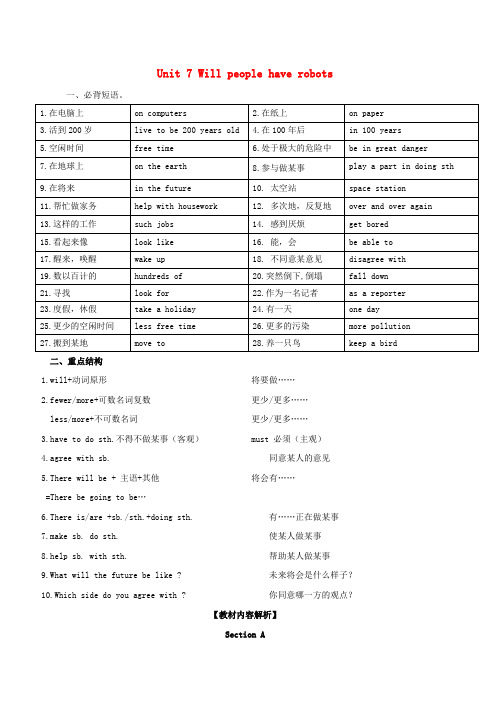
Unit 7 Will people have robots一、必背短语。
二、重点结构1.will+动词原形将要做……2.fewer/more+可数名词复数更少/更多……less/more+不可数名词更少/更多……3.have to do sth.不得不做某事(客观)must 必须(主观)4.agree with sb. 同意某人的意见5.There will be + 主语+其他将会有……=There be going to be…6.There is/are +sb./sth.+doing sth. 有……正在做某事7.make sb. do sth. 使某人做某事8.help sb. with sth. 帮助某人做某事9.What will the future be like ? 未来将会是什么样子?10.Which side do you agree with ? 你同意哪一方的观点?【教材内容解析】Section A1.Do you think there will be robots in people’s homes? (P. 49)本句是主从复合句,从句为宾语从句,如果do you think放在句中,则为插入语,放在特殊疑问词后面,结构为:疑问词+do you think+主语+谓语+其它。
例句:Which do you think is the best movie theatre?2.People will l ive to be 200 years old. (P. 49)live to be+基数词+years old意为“活到……岁”。
例句:In the story, people will live to be 500 years old.3.Will people use money in 100 years? (P. 49)“in+一段时间”表示“在……之后”或“在……之内”,通常用于一般将来时,常用来回答how soon的提问;“for+一段时间”则表示持续多长时间,用来回答how long的提问。
人教新目标八年级英语上册Unit1Wheredidyougoonvacation知识点讲解
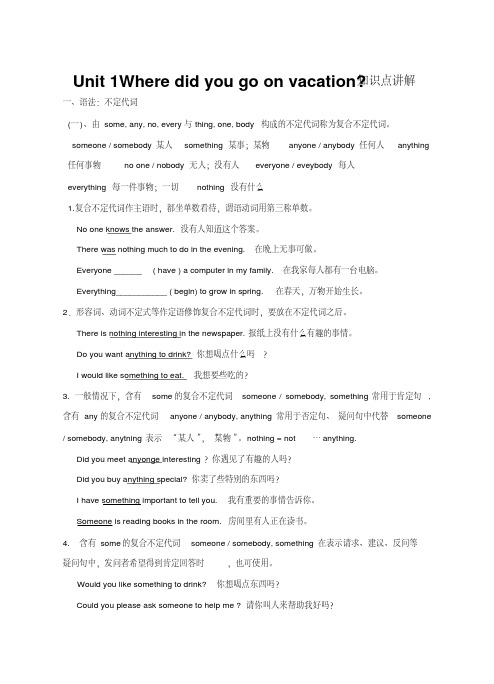
Unit 1Where did you go on vacation?知识点讲解一、语法:不定代词(一)、由some, any, no, every与thing, one, body 构成的不定代词称为复合不定代词。
someone / somebody 某人something 某事;某物anyone / anybody 任何人anything 任何事物no one / nobody 无人;没有人everyone / eveybody 每人everything 每一件事物;一切nothing 没有什么1.复合不定代词作主语时,都坐单数看待,谓语动词用第三称单数。
No one knows the answer. 没有人知道这个答案。
There was nothing much to do in the evening. 在晚上无事可做。
Everyone ______ ( have ) a computer in my family. 在我家每人都有一台电脑。
Everything___________ ( begin) to grow in spring. 在春天,万物开始生长。
2.形容词、动词不定式等作定语修饰复合不定代词时,要放在不定代词之后。
There is nothing interesting in the newspaper.报纸上没有什么有趣的事情。
Do you want anything to drink?你想喝点什么吗?I would like something to eat. 我想要些吃的?3. 一般情况下,含有some的复合不定代词someone / somebody, something常用于肯定句,含有any的复合不定代词anyone / anybody, anything常用于否定句、疑问句中代替someone / somebody, anytning表示“ 某人”,“某物”。
人教版新目标八年级上册英语知识点全册
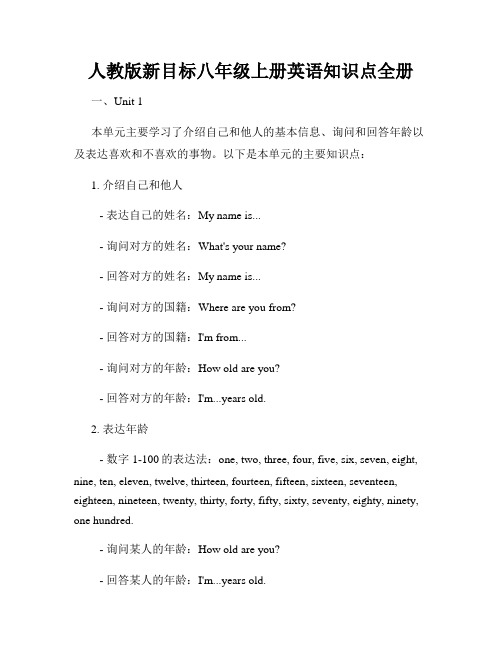
人教版新目标八年级上册英语知识点全册一、Unit 1本单元主要学习了介绍自己和他人的基本信息、询问和回答年龄以及表达喜欢和不喜欢的事物。
以下是本单元的主要知识点:1. 介绍自己和他人- 表达自己的姓名:My name is...- 询问对方的姓名:What's your name?- 回答对方的姓名:My name is...- 询问对方的国籍:Where are you from?- 回答对方的国籍:I'm from...- 询问对方的年龄:How old are you?- 回答对方的年龄:I'm...years old.2. 表达年龄- 数字1-100的表达法:one, two, three, four, five, six, seven, eight, nine, ten, eleven, twelve, thirteen, fourteen, fifteen, sixteen, seventeen, eighteen, nineteen, twenty, thirty, forty, fifty, sixty, seventy, eighty, ninety, one hundred.- 询问某人的年龄:How old are you?- 回答某人的年龄:I'm...years old.3. 表达喜好和不喜好- 喜欢某物:like- 不喜欢某物:don't like- 例句:I like playing basketball. / He doesn't like swimming.二、Unit 2本单元主要学习了询问和指示方向的表达方式,以及介绍某地的位置。
以下是本单元的主要知识点:1. 询问和指示方向- 询问某地的位置:Where is...?- 表示某地的位置:It's...- 例句:Where is the library? It's next to the school.2. 介绍某地的位置- 表示在某地的具体位置:on, in, under, next to, between, behind, in front of.- 例句:The supermarket is next to the bank. / The school is between the hospital and the post office.三、Unit 3本单元主要学习了购物和描述物品的基本词汇和句型。
人教新目标八年级英语上册1-4单元语法点总结
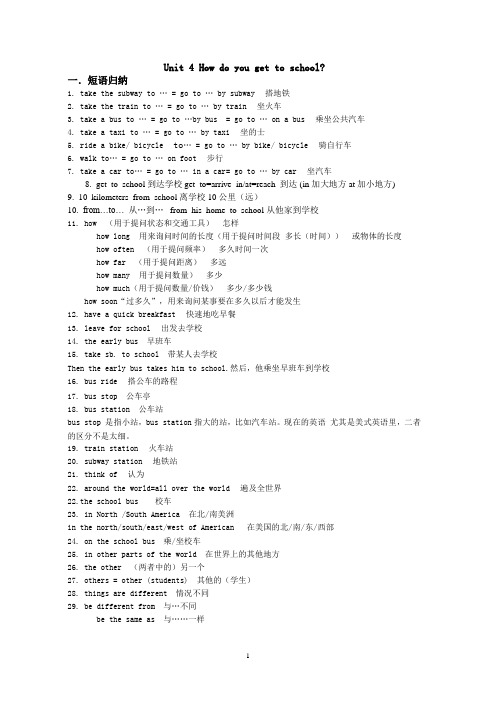
Unit 4 How do you get to school?一.短语归纳1. take the subway to …= go to … by subway搭地铁2. take the train to …= go to … by train坐火车3. take a bus to …= go to …by bus= go to … on a bus乘坐公共汽车4. take a taxi to …= go to … by taxi坐的士5. ride a bike/ bicycle to…= go to … by bike/ bicycle骑自行车6. walk to…= go to … on foot步行7. take a car to…= go to … in a car= go to … by car坐汽车8. get to school到达学校get to=arrive in/at=reach 到达 (in加大地方at加小地方)9. 10 kilometers from school离学校10公里(远)10. from…to…从…到…from his home to school 从他家到学校11. how(用于提问状态和交通工具)怎样how long用来询问时间的长度(用于提问时间段多长(时间))或物体的长度how often(用于提问频率)多久时间一次how far(用于提问距离)多远how many用于提问数量)多少how much(用于提问数量/价钱)多少/多少钱how soon“过多久”,用来询问某事要在多久以后才能发生12. have a quick breakfast快速地吃早餐13. leave for school出发去学校14. the early bus 早班车15. take sb. to school 带某人去学校Then the early bus takes him to school.然后,他乘坐早班车到学校16. bus ride搭公车的路程17. bus stop 公车亭18. bus station 公车站bus stop 是指小站,bus station指大的站,比如汽车站。
202X年人教版新目标八年级上册英语语法知识点

千里之行,始于足下。
202X年人教版新目标八年级上册英语语法知识点人教版新目标八年级上册英语语法知识点主要包括以下方面:一、一般现在时 (Simple Present Tense)1. 表示经常性动作、习惯性动作或普遍真理。
2. 主语为第三人称单数时,动词要加-s或-es。
3. 当主语为第三人称单数时,谓语动词以y结尾的变f辅音+y,再加-es。
4. 特殊情况下,用do/does作助动词,原动词不加-s或-es。
二、一般过去时 (Simple Past Tense)1. 表示过去某个时间发生的动作。
2. 表示过去某段时间内经常发生的动作。
3. 表示过去的状态。
4. 一般过去时的动词变化规则:第一类动词:动词原形+ed;如:play-played第二类动词:动词原形+ed;如:watch-watched第三类动词:动词过去式要单独记忆;如:be-was/were5. 特殊情况下,一般过去时的动词不加-ed。
三、一般将来时 (Simple Future Tense)1. 表示将来某个时间要发生的动作。
2. 表示将来计划或决定要发生的动作。
3. 表示将来的条件、承诺或威胁。
4. 一般将来时的句式:主语+will/shall+动词原形.第1页/共3页锲而不舍,金石可镂。
四、一般现在进行时 (Present Continuous Tense)1. 表示说话人说话的那一刻正在进行的动作。
2. 表示现阶段以及说话人计划或安排即将发生的动作。
3. 表示一段时间内均匀发生或经常反复出现的动作。
4. 现在进行时的句型:主语+am/is/are+动词-ing五、一般进行时与现在进行时的区别一般进行时:表示现在说话人周围或细思恐极发生的动作,特点是强调现时的动作一般都有表示时间的连词或时间状语。
现在进行时:表示说话时正在进行的活动。
六、一般过去进行时一般过去进行时用于表示过去某个时间正在进行的动作。
七、将来进行时 (Future Continuous Tense)将来进行时表示将来某一时间正在进行的动作或状态。
新目标人教版初中八年级上册英语语法汇总

新目标人教版初中八年级上册英语语法汇总1) leave的用法1.“leave+地点”表示“离开某地”。
例如When did you leave Shanghai?你什么时候离开上海的2.“leave for+地点”表示“动身去某地”。
例如Next Friday, Alice is leaving for London. 下周五爱丽斯要去伦敦了。
3.“leave+地点+for+地点”表示“离开某地去某地”。
例如Why are you leaving Shanghai for Beijing?你为什么要离开上海去北京2) 情态动词should“应该”学会使用should作为情态动词用常常表示意外、惊奇、不能理解等有“竟会”的意思例如How should I know? 我怎么知道Why should you be so late today?你今天为什么来得这么晚should有时表示应当做或发生的事例如We should help each other.我们应当互相帮助。
我们在使用时要注意以下几点1. 用于表示“应该”或“不应该”的概念。
此时常指长辈教导或责备晚辈。
例如You should be here with clean hands. 你应该把手洗干净了再来。
2. 用于提出意见劝导别人。
例如You should go to the doctor if you feel ill. 如果你感觉不舒服你最好去看医生。
3. 用于表示可能性。
should的这一用法是考试中常常出现的考点之一。
例如We should arrive by supper time. 我们在晚饭前就能到了。
She should be here any moment. 她随时都可能来。
3) What...? 与Which...?1. what 与which 都是疑问代词都可以指人或事物但是what仅用来询问职业。
如Whatis your father? 你父亲是干什么的该句相当于What does your father do?What is your father's job?Which 指代的是特定范围内的某一个人。
人教版八年级上册英语知识点总结

人教版八年级上册英语知识点总结一、语法重点1. 时态- 一般现在时:表示经常发生的动作或状态,以及普遍真理。
- 一般过去时:描述过去发生的动作或状态。
- 现在进行时:表示正在进行的动作。
- 过去进行时:描述过去某一时刻正在进行的动作。
2. 代词- 人称代词主格:I, you, he, she, it, we, they。
- 物主代词:my, your, his, her, its, our, their。
- 反身代词:myself, yourself, himself, herself, itself, ourselves, yourselves, themselves。
3. 介词- 表示时间的介词:at, on, in。
- 表示地点的介词:at, on, in。
- 其他常用介词:with, by, for, from, to, of。
4. 句型结构- 一般疑问句:使用助动词do/does构成。
- 特殊疑问句:使用疑问词who, what, where, when, why, how 等。
- 否定句:使用助动词do/does后跟not。
5. 词汇- 动词短语:take off, turn on/off, get up, go to bed等。
- 形容词和副词:big/large, small, quick/fast, slowly, carefully等。
- 常用名词:student, teacher, school, family, friend等。
二、词汇与短语1. 学校相关词汇- classroom, teacher, student, library, gym, cafeteria。
- subject, lesson, homework, project, test, exam。
2. 家庭与朋友- family, parent, brother, sister, friend, neighbor。
(完整)新目标八年级上册英语语法知识点精讲+练习,推荐文档
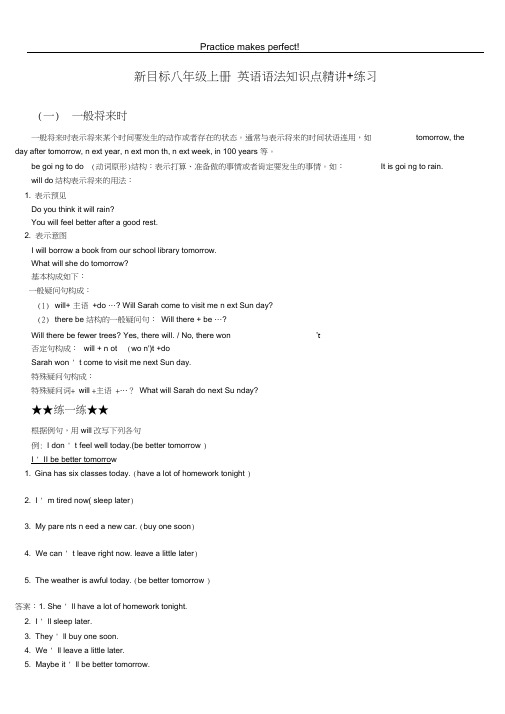
新目标八年级上册英语语法知识点精讲+练习(一)一般将来时一般将来时表示将来某个时间要发生的动作或者存在的状态。
通常与表示将来的时间状语连用,如tomorrow, the day after tomorrow, n ext year, n ext mon th, n ext week, in 100 years 等。
be goi ng to do (动词原形)结构:表示打算、准备做的事情或者肯定要发生的事情。
如:It is goi ng to rain.will do结构表示将来的用法:1. 表示预见Do you think it will rain?You will feel better after a good rest.2. 表示意图I will borrow a book from our school library tomorrow.What will she do tomorrow?基本构成如下:一般疑问句构成:(1)will+ 主语+do …? Will Sarah come to visit me n ext Sun day?(2)there be 结构的一般疑问句:Will there + be …?Will there be fewer trees? Yes, there will. / No, there won 't否定句构成:will + n ot (wo n')t +doSarah won ' t come to visit me next Sun day.特殊疑问句构成:特殊疑问词+ will +主语+…?What will Sarah do next Su nday?★★练一练★★根据例句,用will改写下列各句例: I don ' t feel well today.(be better tomorrow )I ' II be better tomorrow1. Gina has six classes today. (have a lot of homework tonight )2. I ' m tired now( sleep later)3. My pare nts n eed a new car. (buy one soon)4. We can ' t leave right now. leave a little later)5. The weather is awful today. (be better tomorrow )答案:1. She ' ll have a lot of homework tonight.2. I ' ll sleep later.3. They ' ll buy one soon.4. We ' ll leave a little later.5. Maybe it ' ll be better tomorrow.(二)should 的用法:should用来提出建议和忠告,后边加动词原形,否定句直接在should后边加not.例如:I think you should eat less junk food.我认为你应该少吃垃圾食品。
人教新目标英语八年级上册 Unit 1 sectionA语法知识点总结

人教新目标英语八年级上册Unit 1 sectionA语法知识点总结Unit 1 Where did you go on vacation?一般过去时态的概念:1.表示过去某时间发生的动作或存在的状态。
2.表示过去经常性习惯性的动作。
一般过去时常用的标志词有:yesterday,the day before yesterday,last week/month/year, just now, …ago,in+过去时间…一.用Be动词的一般过去时(1)肯定句式:主语+ was / were + 其它.(2)否定句式:主语+ wasn’t /weren’t+ 其它.(3)一般疑问句:Was/Were + 主语+ 其它?肯定回答:Yes,主语+ was / were .否定回答:No,主语+ wasn’t /weren’t.(4)特殊疑问词+was/were+主语+其他?肯定句:The air was clean yesterday.否定句:The air wasn't clean yesterday.一般疑问句:Was the air clean yesterday?肯定回答:Yes, it was.否定回答:No, it wasn't.特殊疑问句:How was the air yesterday?二.行为动词(v.)的一般过去时态(1)肯定句式:主语+ v-ed+ 其它.【do , does---did】(2)否定句式:主语+ didn’t + v原形+ 其它. 【did not = didn’t】(3)一般疑问句:Did + 主语+ v原形+ 其它?肯定回答:Yes,主语+did.否定回答:No,主语+did’t.(4)特殊疑问词+did+主语+v.原形+其他?肯定句:I rode a horse last Sunday.否定句:I didn‘t ride a horse last Sunday.一般疑问句:Did you ride a horse last Sunday? 肯定回答:Yes, I did.否定回答:No, I didn't.特殊疑问句:(1)What did you do last Sunday?(2)When did you ride a horse?三、动词过去式的构成1. 规则动词的过去式1) 一般情况下,在动词原形后面加-ed。
人教新目标英语八年级上册unit1-Unit4单元重点知识复习
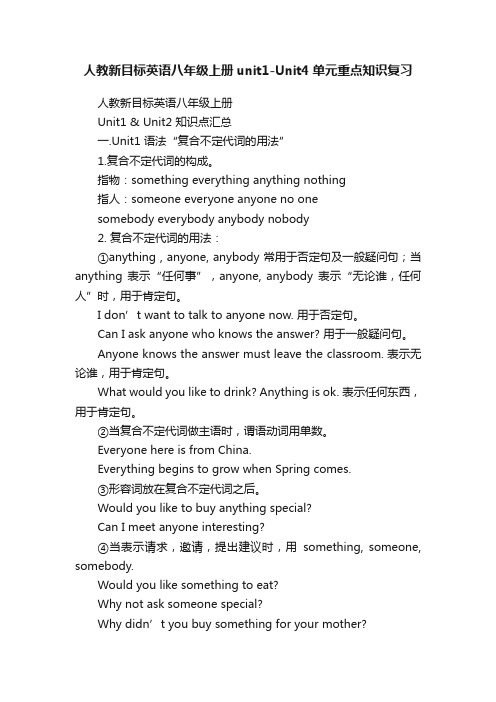
人教新目标英语八年级上册unit1-Unit4单元重点知识复习人教新目标英语八年级上册Unit1 & Unit2 知识点汇总一.Unit1 语法“复合不定代词的用法”1.复合不定代词的构成。
指物:something everything anything nothing指人:someone everyone anyone no onesomebody everybody anybody nobody2. 复合不定代词的用法:①anything , anyone, anybody 常用于否定句及一般疑问句;当anything 表示“任何事”,anyone, anybody 表示“无论谁,任何人”时,用于肯定句。
I don’t want to talk to anyone now. 用于否定句。
Can I ask anyone who knows the answer? 用于一般疑问句。
Anyone knows the answer must leave the classroom. 表示无论谁,用于肯定句。
What would you like to drink? Anything is ok. 表示任何东西,用于肯定句。
②当复合不定代词做主语时,谓语动词用单数。
Everyone here is from China.Everything begins to grow when Spring comes.③形容词放在复合不定代词之后。
Would you like to buy anything special?Can I meet anyone interesting?④当表示请求,邀请,提出建议时,用something, someone, somebody.Would you like something to eat?Why not ask someone special?Why didn’t you buy something for your mother?Unit2 语法“频率副词”How often 常用于对频率的提问,意为“多长时间一次”,其答语可以是once/ twice / three times a week; always/ usually/ often/ sometimes/ hardly ever/ never 等表示时间频率的副词及短语。
人教版新目标八年级上册英语语法知识点

人教版新目标八年级上册英语语法知识点(一)一般将来时一般将来时表示将来某个时间要发生的动作或者存在的状态。
通常与表示将来的时间状语连用,如tomorrow, the day after tomorrow, next year, next month, next week, in 100 years等。
be going to do(动词原形)结构:表示打算、准备做的事情或者肯定要发生的事情。
如:It is going to rain.will do结构表示将来的用法:1. 表示预见Do you think it will rainYou will feel better after a good rest.2. 表示意图I will borrow a book from our school library tomorrow.What will she do tomorrow基本构成如下:一般疑问句构成:(1)will+主语+do…Will Sarah come to visit me next Sunday(2)there be 结构的一般疑问句:Will there + be …Will there be fewer trees Yes, there will. / No, there won’t否定句构成:will + not (won’t)+doSarah won’t come to visit me next Sunday.特殊疑问句构成:特殊疑问词+will+主语+…?What will Sarah do next Sunday★★练一练★★根据例句,用will改写下列各句例:I don’t feel well today. (be better tomorrow)I’ll be better tomorrow.1. Gina has six classes today. (have a lot of homework tonight)_____________________________2. I’m tired now. (sleep later)_____________________________3. My parents need a new car. (buy one soon)_____________________________4. We can’t leave right now. (leave a little later)_____________________________5. The weather is awful today. (be better tomorrow)_____________________________答案:1. She’ll have a lot of homework tonight.2. I’ll sleep later.3. They’ll buy one soon.4. We’ll leave a little later.5. Maybe it’ll be better tomorrow.(二)should的用法:should用来提出建议和忠告,后边加动词原形,否定句直接在should后边加not.例如:I think you should eat less junk food.我认为你应该少吃垃圾食品。
人教版新目标八年级上册英语知识点全册

Unit1 Where did you go on vacation?重点短语1. go on vacation去度假2.stay at home 待在家里3.go to the mountains 去爬山4. go to the beach 去海滩5. visit museums 参观博物馆6. go to summer camp 去参加夏令营7.quite a few 相当多8.study for 为……而学习9.go out 出去10.most of the time 大部分时间11. taste good 尝起来很好吃12.have a good time 玩得高兴13. of course 当然14.feel like 给……的感觉;感受到15.go shopping 去购物16.in the past 在过去17. walk around 四处走走18. because of 因为19. one bowl of… 一碗……20. the next day 第二天21. drink tea 喝茶22. find out 找出;查明23. go on 继续24.take photos 照相25. something important 重要的事26. up and down 上上下下27. come up 出来28. buy sth. for sb. / buy sb. sth. 为某人买某物29. taste + adj. 尝起来……30. look+adj. 看起来……31.nothing…but+动词原形除了……之外什么都没有32.seem+(to be)+ adj. 看起来……33. arrive in+大地点/ arrive at+小地点到达某地34.decide to do sth. 决定去做某事35. try doing sth. 尝试做某事/36. try to do sth. 尽力去做某事37. forget doing sth. 忘记做过某事/38. forget to do sth. 忘记做某事39. enjoy doing sth. 喜欢做某事40. want to do sth. 想去做某事41. start doing sth. 开始做某事42. stop doing sth. 停止做某事43. dislike doing sth.不喜欢做某事44. keep doing sth. 继续做某事45. Why not do. sth.? 为什么不做……呢?46. so+adj.+that+从句如此……以至于……47. tell sb. (not) to do sth. 告诉某人(不要)做某事48 .have a good time=enjoy oneself=have fun(doing sth.)玩得痛快三、重点句子:1. Where did you go on vacation? 你去哪儿度假的?2. Long time no see. 好久不见。
- 1、下载文档前请自行甄别文档内容的完整性,平台不提供额外的编辑、内容补充、找答案等附加服务。
- 2、"仅部分预览"的文档,不可在线预览部分如存在完整性等问题,可反馈申请退款(可完整预览的文档不适用该条件!)。
- 3、如文档侵犯您的权益,请联系客服反馈,我们会尽快为您处理(人工客服工作时间:9:00-18:30)。
人教版新目标八年级上册英语语法知识点(一)一般将来时一般将来时表示将来某个时间要发生的动作或者存在的状态。
通常与表示将来的时间状语连用,如tomorrow, the day after tomorrow, next year, next month, next week, in 100 years等。
be going to do(动词原形)结构:表示打算、准备做的事情或者肯定要发生的事情。
如:It is going to rain.will do结构表示将来的用法:1. 表示预见Do you think it will rain?You will feel better after a good rest.2. 表示意图I will borrow a book from our school library tomorrow.What will she do tomorrow?基本构成如下:一般疑问句构成:(1)will+主语+do…? Will Sarah come to visit me next Sunday?(2)there be 结构的一般疑问句:Will there + be …?Will there be fewer trees? Yes, there will. / No, there won’t否定句构成:will + not (won’t)+doSarah won’t come to visit me next Sunday.特殊疑问句构成:特殊疑问词+will+主语+…?What will Sarah do next Sunday?★★练一练★★根据例句,用will改写下列各句例:I don’t feel well today. (be better tomorrow)I’ll be better tomorrow.1. Gina has six classes today. (have a lot of homework tonight)_____________________________2. I’m tired now. (sleep later)_____________________________3. My parents need a new car. (buy one soon)_____________________________4. We can’t leave right now. (leave a little later)_____________________________5. The weather is awful today. (be better tomorrow)_____________________________答案:1. She’ll have a lot of homework tonight.2. I’ll sleep later.3. They’ll buy one soon.4. We’ll leave a little later.5. Maybe it’ll be better tomorrow.(二)should的用法:should用来提出建议和忠告,后边加动词原形,否定句直接在should后边加not.例如:I think you should eat less junk food.我认为你应该少吃垃圾食品。
She drives a lot and she seldom walks. So I think she should walk a lot.她经常开车,很少走路。
所以我认为她应该多走路。
Students shouldn’t spend too much time playing computer games.学生们不应当花太多的时间玩计算机游戏。
学习向别人提建议的几种句式:(1)I think you should…(2)Well, you could…(3)Maybe you should …(4)Why don’t you…?(5)What about doing sth.?(6)You’d better do sth.★★练一练★★用should或shouldn’t填空1. I can’t sleep the night before exams.You ______ take a warm shower before you go to bed.2. Good friends ______ argue each other.3. There is little milk in the glass. We _______ buy some.4. They didn’t invite you? Maybe you ______ be friendlier.5. I am a little bit overweight. So I think I _______ do exercises every day.答案:1. should 2. shouldn’t 3. should 4. should 5. should(三)过去进行时过去进行时表示过去某一点时间正在进行的动作或者过去某一段时间内一直进行的动作。
1. 构成was /were + doing,例如:I was watching TV at 9 o’clock last night.at 9 o’clock last night是时间点They were playing football all afternoon.all afternoon是时间段2. 过去进行时的标志词at 8 o’clock last night, this time yesterday等。
例如:I was having lunch at home this time yesterday.昨天的这个时候我正在吃午饭。
At that time she was writing a book.那阵子她在写一本书。
(表示她在那段时间里一直在做那件事情。
)★★练一练★★用括号中所给动词的适当形式填空。
1. This time yesterday I ____ ______(read)books.2. At 9 o’clock last Sunday they ______ ______(have)a party.3. When I _____(come)into the classroom, she ________ ______(read)a storybook.4. She _____ ______(play)computer games while her mother ____ ______(cook)yesterday afternoon.5. I _____ ______(have)a shower when you _______(call)me yesterday.答案:1. was reading 2. were having 3. came; was reading4. was playing; was cooking5. was having; called(四)间接引语形成步骤:(1)不要逗号,冒号,引号(2)要考虑到人称的变化(人称的变化与汉语是一致的)(3)要考虑时态的变化(4)要考虑时间状语、地点状语和语示代词的变化。
★★练一练★★用括号中所给动词的适当形式填空。
1. She said I _____(be)hard-working.2. Peter told me he _____(be)bored yesterday.3. She said she _____(go)swimming last Sunday.4. Bobby said he _____(may)call me later.5. Antonio told me he _____(read)a book then.答案:1. was 2. was 3. went 4. might 5. was reading请转述他人说的话:1. I go to the beach every Saturday. (Tom)2. I can speak three languages. (Lucy)3. I will call you tomorrow. (Mike)4. I’m having a surprise party for Lana. (she)(五)if引导的条件状语从句结构:if+一般现在时,主语+将来时含义:如果……,将要……例如:If you ask him, he will help you.如果你请求他,他会帮助你。
If need be, we’ll work all night.如果需要,我们就干个通宵。
★★练一练★★根据中文提示,完成句子。
1. 如果你参加聚会,你将会过得很开心。
If you ________ the party, you __________.2. 如果明天下雨,我们将不去野餐。
If it __________ tomorrow, we ___________.3. 如果你经常听英文歌,你将会喜欢英语的。
If you often ________, you _________________.答案:1. If you go to the party, you will have a good time2. If it rains tomorrow, we won’t go to the picnic3. If you often listen to English songs, you’ll like English二. 完形填空特点及解题思路(一)题型分类与特点完形填空试题是在给出的一篇短文中有目的地拿掉若干个词,留下一些空格,要求考生借助短文保留的部分,从所给的短文整体出发,在正确理解短文意思的基础上,根据句子和句子间的内在联系、词的用法和习惯搭配等,用适当的词或词语填空,使补全后的短文意思通顺、前后连贯、结构完整。
这种题型测试的内容从形式上看是单词或短语的填空,但它必须注意到短文中上、下文意思连贯、词语搭配和语法结构正确,所以在空格上所填的词必须符合语义适用和语法正确两条原则,只考虑某一侧面都可能导致错误。
中考中完形填空试题的基本题型分两类:完形填空选择题和完形填空题。
1. 完形填空选择题:该题型的特点是将一篇短文中若干词语抽掉留下空格,对每一空格提供若干个选择项,要求考生通读短文后,在理解短文意思的基础上,运用所学的词汇、句型、语法等语言知识,从所提供的备选项中选出一个最佳答案,使短文内容完整正确。
